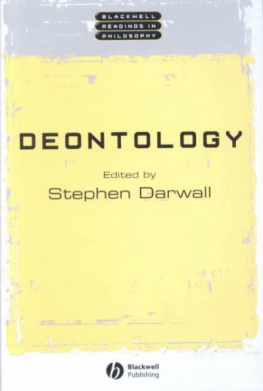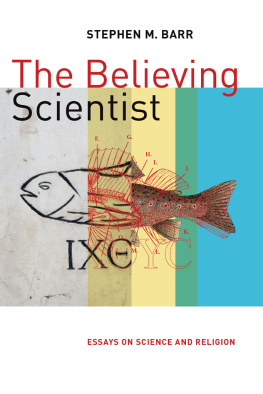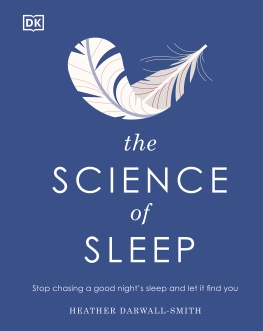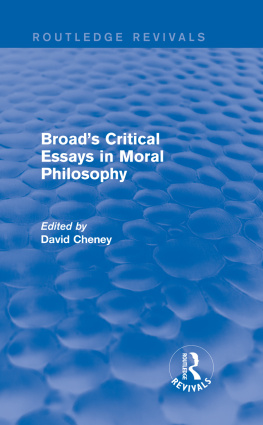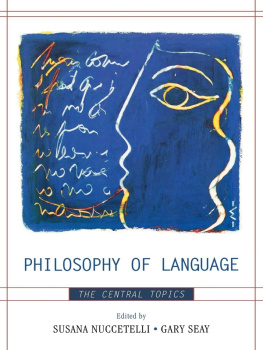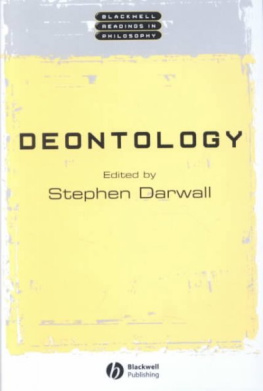Series Editor: Steven M. Cahn
Blackwell Readings in Philosophy are concise, chronologically arranged collections of primary readings from classical and contemporary sources. They represent core positions and important developments with respect to key philosophical concepts. Edited and introduced by leading philosophers, these volumes provide valuable resources for teachers and students of philosophy, and for all those interested in gaining a solid understanding of central topics in philosophy.
1. God and the Problem of Evil
Edited by William L. Rowe
2. Episteiiiology: lnternalisrn and Externalism
3. Free Will
4. Democracll
5. Meaning
6. Philosophical Skepticism
7. Consequentialisnr
8. Contractariaiiism/Contr'actualism
9. Deontology
10. Virtue Ethics
11. Personalldentity
12. Perception






Contents
Acknowledgments
I am indebted to Steven Cahn for initially suggesting the idea of this anthology, to Jeff Dean for patiently shepherding me through the production process, to Blackwell's anonymous referees for very helpful comments, to Anthony Grahame for expert copy-editing, and to Sue London for yeoman work in copying.
The editor and publisher gratefully acknowledge the following for permission to reproduce copyright material:
Chapters 1, 2, and 3: Immanuel Kant, from Groundwork of the Metaphysics of Morals (1998), and from Practical Philosophy (1996), both ed. and trans. Mary Gregor. Reproduced by permission of Cambridge University Press;
Chapter 4: Richard Price, from A Rez'icze of the Principal Questions in Morals, edited by D. D. Raphael, 1974. Reproduced by permission of the editor;
Chapter 5: W. D. Ross, from The Right and tlu' Good. Copyright 1967 by Oxford University Press. Reproduced by permission of Oxford University Press;
Chapter 6: Robert Nozick, "Moral Constraints and Moral Goals," from Anarchy, Stag, and Utopia. Copyright 1974 by Basic Books, Inc. Reproduced by permission of Perseus Books;
Chapter 7: Thomas Nagel, from The View from Nowhere by Thomas Nagel, copyright 1986 by Thomas Nagel. Reproduced by permission of Oxford University Press, Inc.;
Chapter 8: Stephen Darwall, "Agent-Centred Restrictions From the Inside Out" from Philosophical Studies 50 (1986). Reproduced by kind permission of the author and Kluwer Academic Publishers;
Chapter 9: Judith Jarvis Thomson, "The Trolley Problem". Reprinted by permission of the Yale Law Journal Company and William S. Hein Company from The Yale Lain Journal 94, pp. 1395-1415;
Chapter 10: Frances Myrna Kamm, "Harming Some to Save Others" from Philosophical Studies 57 (1989). Reproduced by kind permission of the author and Kluwer Academic Publishers;
Chapter 11: Warren S. Quinn, "Actions, Intentions, and Consequences: The Doctrine of Double Effect" from Philosophy & Public Affairs 18 (1989). Copyright 1989 by Princeton University Press. Reprinted by permission of Princeton University Press;
Chapter 12: Christine M. Korsgaard, "The Right to Lie: Kant on Dealing with Evil" from Philosophy & Public Affairs 15 (1986). Copyright 1986 by Princeton University Press. Reprinted by permission of Princeton University Press.
The publisher apologizes for any errors or omissions in the above list and would be grateful if notified of any corrections that should be incorporated in future reprints or editions of this book.
Introduction
Deontological theories can be defined by their opposition to consequentialism on a fundamental point. Consequentialists hold that what it is morally right or wrong to do depends upon what would bring about the best consequences, where the latter are evaluated simply as states of the world, as good or bad things to happen. Moral values, consequentialists believe, are ultimately instrumental, consisting in the promotion of values that, because they are prior to morality, are "nonmoral."
Consider, for example, the species of consequentialism called "utilitarianism." Utilitarians believe that it is a good thing in itself, irrespective of any relation to conduct and character, when sentient beings experience pleasure and that it is intrinsically bad when they experience pain. Nonmoral values of two different sorts are thought to be involved. Most obviously, since pleasure and pain are in their natures good and bad for those who experience them, these states involve "agent-relative" good and evil, respectively.' But what is most distinctive about utilitarianism as a fundamental approach to moral philosophy is the idea that the experience of pleasure and pain are good and bad things to happen period, from an "agent-neutral" perspective. The state of the world in which a being experiences pleasure is, it holds, good in a way that gives a?i.y agent a reason to cause it to exist. This pattern is repeated, moreover, with consequentialism more generally. Consequentialists believe that moral conduct and character are instrumental to states of the world whose agent-neutral value gives any agent a reason to bring them about.
As against this, deontology holds that moral values and standards cannot be determined at any level of analysis by what would promote the best outcomes or states, assessed agent-neutrally. Indeed, deontologists are frequently skeptical of the very idea of agent-neutral, nonmoral evaluations of outcomes. And they unite in the belief that at least some fundamental moral principles or ideas are agent-relative "all the way down."
Consider the following example. Suppose a consequentialist holds that among the intrinsically bad things that can happen is someone's being betrayed by a friend. The thought here is not that it is wrong to betray friends, or even (exactly) that this is a had thing to do, but that betrayals are bad things to happen. And again, it is not just that it is bad for the person betrayed (agent-, or in this case, patient-relatively), but that it is a had thing period (agent-neutrally) for someone to be betrayed. If betrayals are bad things to happen, then it would be good, other things being equal, to prevent them. Suppose that there are two people, A and B, who are contemplating betraying their friends. Suppose also that circumstances are such that if you betray hour friend, A and B will be so horrified that they will not betray theirs, although they would have otherwise. If we consider what you should do in light of what would be best to happen, you would seem to have reason to betray your friend since that would produce fewer intrinsically disvaluable states of betrayal. And, other things being equal, this is precisely what an act-consequentialist would say. Against this, deontologists argue that many moral duties are agent-relative. How an agent may or must act frequently depends on the various relations he or she stands in to others and this, they argue, is so in this case. The moral duty not to betray one's friends, deontologists claim, is agent-relative, irreducible to any agent-neutral values, even if we assume that betrayals have intrinsic (agent-neutral) disvalue themselves.

